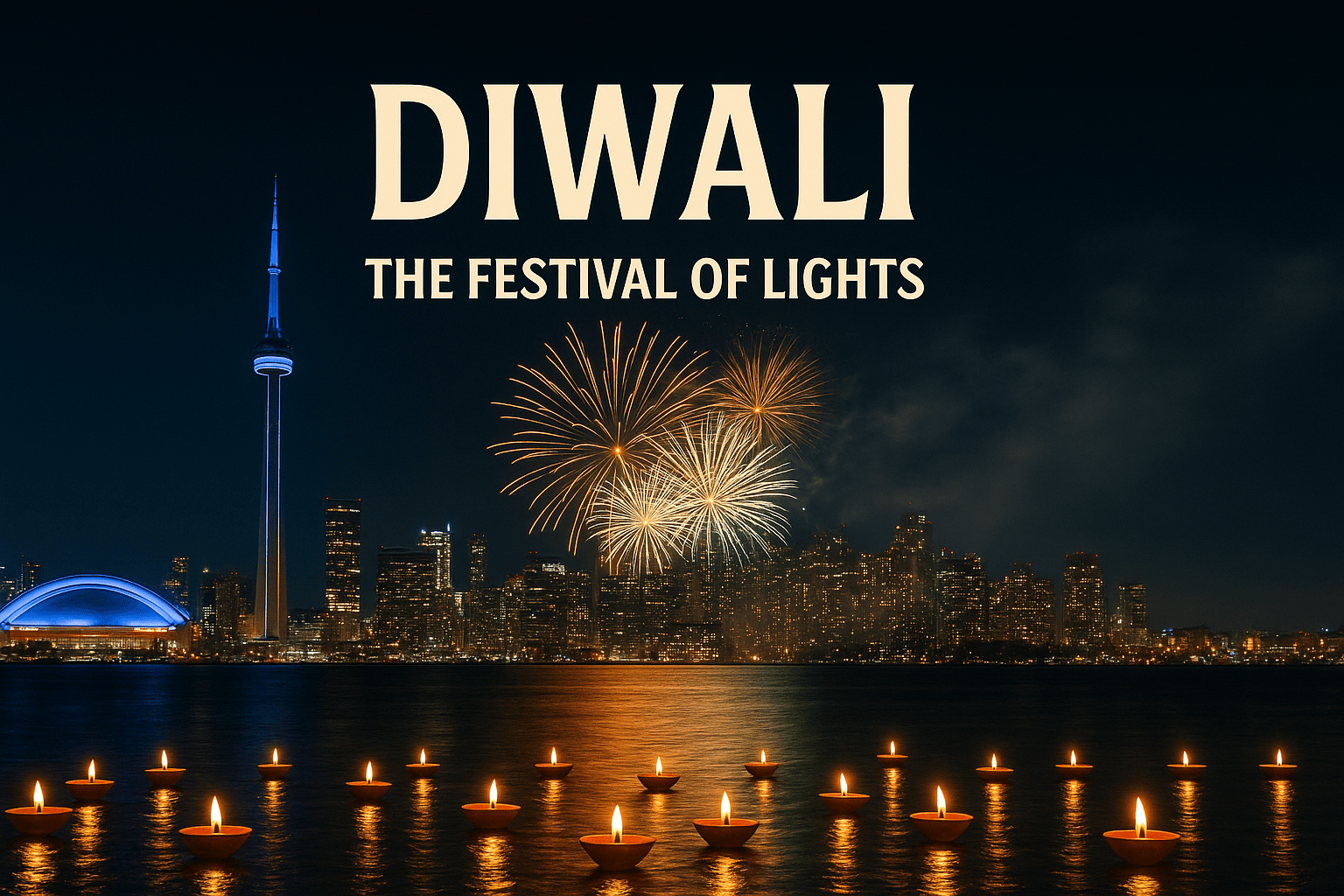🪔 The Festival of Lights Across North America
Diwali — the Festival of Lights — has found a second home in Canada and the United States. What began as a traditional Hindu celebration in India has grown into a multicultural North American festival that transcends religion and background. Whether you walk through Toronto’s Gerrard Street, Vancouver’s Surrey, or New York’s Jackson Heights, the air fills with the scent of sweets, flickering diyas (lamps), and laughter echoing through neighborhoods.
For millions of Indian immigrants and second-generation families, Diwali in Canada and the U.S. is not just about tradition — it’s about belonging. It’s a time to celebrate heritage, reconnect with roots, and share the joy of light conquering darkness with neighbors of all cultures.
🇨🇦 How Diwali is Celebrated in Canada 🎆
In Toronto, Diwali has become a major cultural event. Gerrard India Bazaar and Brampton’s temples host colorful fairs, fireworks (where allowed), and community feasts. Families decorate homes with diyas, string lights, and rangoli patterns at their doors. Indian sweets — laddoos, barfi, and jalebis — are exchanged like Christmas cookies.
Vancouver and Surrey host some of the largest public Diwali festivals in North America, with music, dance performances, and multicultural food stalls. Even city landmarks like the Vancouver Art Gallery and Niagara Falls light up in gold to mark the occasion.
Calgary, Ottawa, and Montreal have also embraced Diwali through cultural parades and temple gatherings. Canadian workplaces and schools often join in by organizing “Diwali potlucks” and lighting symbolic diyas, reflecting the country’s inclusive spirit.
🚫 Where Firecrackers Are Banned in Canada
While fireworks are an iconic part of Diwali, many Canadian cities regulate or restrict their use due to safety and environmental concerns. Rules vary by municipality:
- Toronto: Fireworks are not allowed on private property without a permit. Public fireworks are restricted to city-designated days like Victoria Day or Canada Day — not Diwali.
- Mississauga: Fireworks on private property require a permit. Violations can result in fines.
- Brampton: Fireworks are banned on streets, parks, and public property. Home displays are only allowed on Victoria Day and Canada Day.
- Vancouver & Surrey: Residents need a permit, and only specific areas allow fireworks.
- Calgary, Ottawa, and Edmonton: Fireworks require written authorization and cannot be used without city approval.
Many families celebrate instead by lighting diyas, using LED sparklers, or attending community fireworks shows organized by temples or local associations.
In short, the light still shines bright, even without the bang.
🇺🇸 Diwali in the United States
In the United States, Diwali has become a mainstream cultural celebration. Cities like New York, Houston, San Francisco, and Chicago host massive public festivals that attract people of all backgrounds.
- New York City lights up Times Square for a full-day “Diwali at Times Square” event, featuring music, food, and dance.
- In California, communities in Fremont and San Jose — home to large Indian populations — organize night markets, temple events, and cultural parades.
- Washington D.C. and Houston see official recognitions from mayors and governors, sometimes even raising the “Diwali flag.”
Many American schools have begun recognizing Diwali as an official holiday in districts with significant South Asian populations. Offices host Diwali lunches, tech companies decorate lobbies, and families open their homes to share Indian culture through food and tradition.
🌏 A Festival That Unites Cultures
What’s beautiful about Diwali in North America is how it has evolved from an ethnic celebration into a universal message of hope, gratitude, and unity. Non-Indian neighbors join in lighting diyas, exchanging gifts, and learning the stories of Rama, Sita, and Lakshmi.
As second-generation Indian Canadians and Americans grow up, they blend tradition with modern life — lighting candles next to Alexa speakers, or sending digital rangolis over WhatsApp. Diwali has become not just a religious festival, but a shared cultural expression of joy, light, and resilience.
Final Thoughts
From the snowy streets of Canada to the sunny neighborhoods of California, Diwali continues to illuminate hearts across North America. Even where fireworks are banned, the festival’s light never dims — it only shines brighter through community, kindness, and connection.
In a time when the world often feels divided, Diwali reminds us that light always wins — not just in homes and temples, but in the spirit of togetherness that bridges continents and cultures.




